Infrastructure Week 2019
Infrastructure Week 2019 has arrived! This week is dedicated to educating and advocating for national infrastructure. At Thrasher, we believe in supporting our local communities. That’s why we take on demanding projects and aim to solve the infrastructure challenges within them. Throughout this week, our social media platforms will be highlighting our employees who strive to create infrastructure solutions.
5/20/19 – Transportation
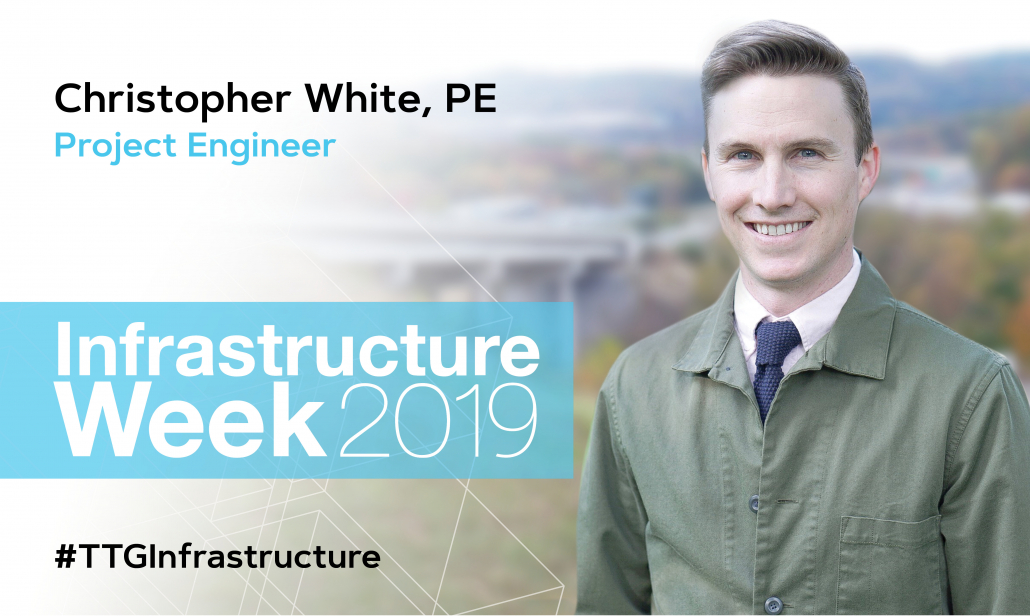
Six months ago, Christopher White joined Thrasher’s Transportation Division ready to apply his impressive project experience in design, execution, and completion of bridge construction. Christopher has utilized his skills in structural design, stress analysis, using three-dimensional modeling software, quality assurance of project drawings, independent verification, and construction activities in his role at Thrasher. Christopher reflected on growing up outside of New York City, viewing the city’s silhouette and its iconic bridges, “I had a desire to use my gifts and talents to better my community and therefore pursued an education that would prepare me to design bridges.”
A few significate projects Christopher has taken on was the Smither Creek Bridge in Fayette County, WV and the Bradshaw Creek Bridge in Summers County, WV. He stated that bridges have a huge impact on community’s infrastructure, “A bridge, in its essence, creates connections. It provides vital pathways between communities, and it is my belief that connected communities thrive.”
What are some lessons that you have learned through working on projects that improve infrastructure?
“The importance of fiscal responsibility at all levels of government. Many categories of infrastructure are public goods, maintained by the government and benefitting the people, such as water, roads and bridges. A lot of work is required to fulfill that responsibility and there are significant costs that are associated with each task. How, when, and where citizen’s monetary contributions are used are very important decisions, and I feel it is our duty as engineers to help governments make the best-informed decision to maximize the money they spend on infrastructure projects.”
What advice would you give an individual who is interested in entering a similar field and projects as yourself?
“For those still in school, study! There is a lot of knowledge needed to design and analyze a bridge … Then once you enter the field, find a mentor and ask questions! Theory guides practice, but bridges aren’t built in a vacuum, and the wisdom that comes from years of experience will help account for real world variables.”
5/17/19 – Utilities
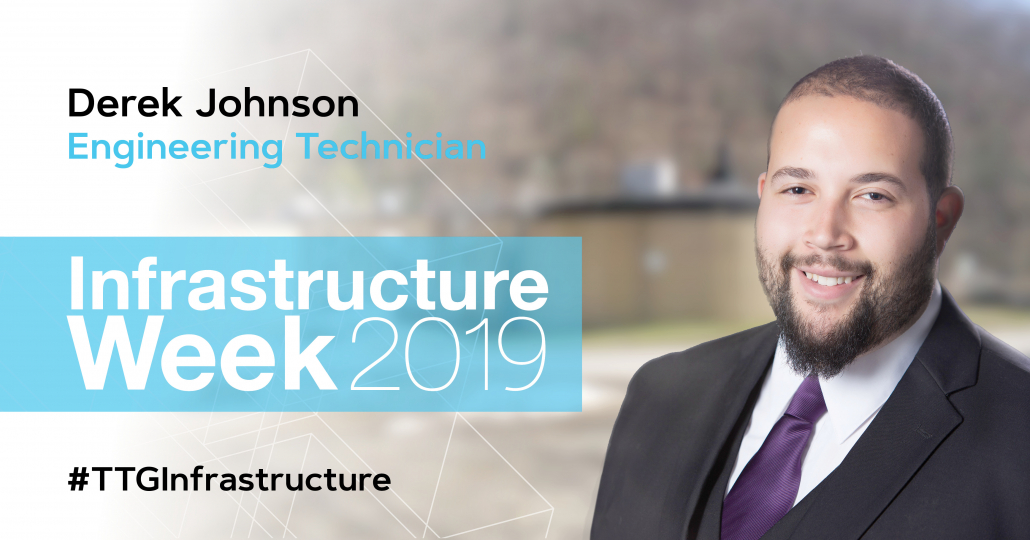
Derek Johnson
In 2013, Derek Johnson joined The Thrasher Family in the water department of our Utilities Division. His success working on water systems and wastewater projects can be attributed to his proficiency in project design and management. An impressive skill he processes is being self-taught in Revit. The three-dimensional software is mobilized in Thrasher’s Architecture Division. Derek, however, believes the software is beneficial in utilities construction: “Scanning and digital three-dimensional software cuts out margin of error,” he said. “Compared to analyzing and developing blueprints, Revit is much easier to interpret.”
Derek has worked on various projects that have improved community’s infrastructure. A few notable projects he worked on include the Town of Union’s UTC Waterline Extension and their Source Water Study, where he served a Project Engineer. Derek stated, “Wastewater and water systems are vital to communities. Our utilities projects improve infrastructure and help transport a reliable water supply to residence of the community.”
What are some lessons that you have learned through working on projects that improve infrastructure?
“Never assume there is only one way to solve a problem. Be flexible – creativity during the process will lead to a solution.”
What advice would you give an individual who is interested in entering a similar field and projects as yourself?
“Get firsthand experience on site. There are a lot of aspects of the process that can be overlooked when planning in office.”
5/16/19 – Stormwater
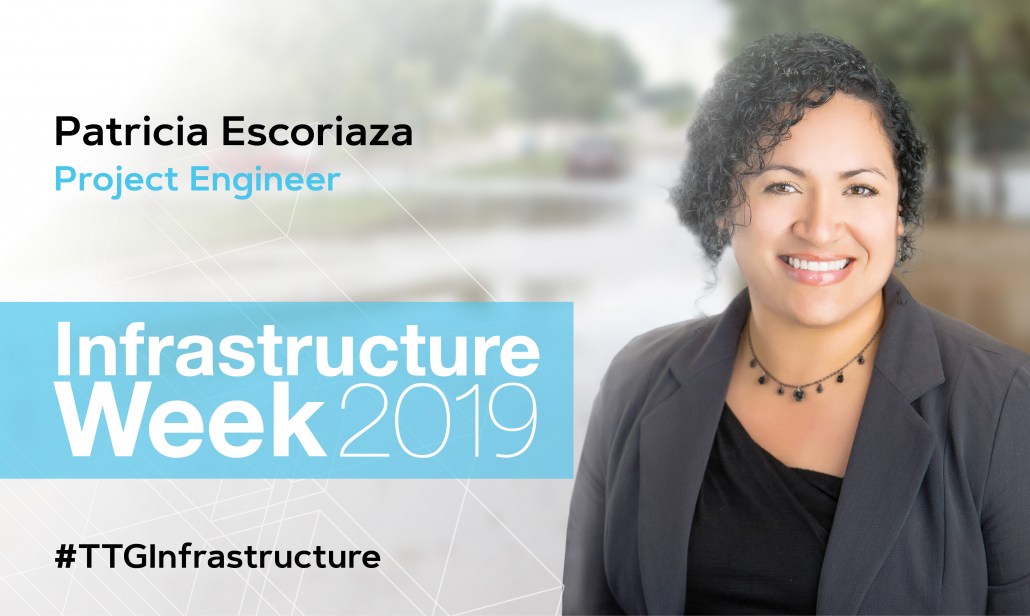
Patricia Escoriaza
Patricia is an accomplished Project Engineer in Thrasher’s Site Division. She brings an impressive educational background, as well as a wealth of experience gained while in the US Marines, where she instructed peers in electrical and mechanical engineering, as well as safety procedures. Her notable credentials allow Patricia to unique deliver project solutions to each client. She has seen particular success in the stormwater field. Since 2013, she has led our team on a variety of stormwater projects, including the City of Clarksburg’s MS4 Permitting and Fairmont State University’s MS4 Permitting.
Her passion for improving stormwater systems stems from her time growing up in Puerto Rico.
“Due to Puerto Rico being surrounded by water, it was absolutely important to maintain the stormwater system,” Patricia said. She noted that efficient stormwater systems are one of the vital foundations of infrastructure – pollution and various contaminates in water affects their surroundings from the public’s use to the environment.
“Constructing buildings and other infrastructure developments cannot happen without analyzing the run-off or water in the area,” she continued. “Stormwater is often overlooked but it has quite the impact.”
What significant infrastructure improvements have resulted from your projects?
“The projects I’ve worked on resulted in preventing pollution, improving water quality, constructing new filters/systems, and updating treatment plants.”
What are some lessons that you have learned through working in projects that improve infrastructure?
“It’s important to research the history of the region and its problems. This background information helps identify the issues and reach possible solutions.”
5/15/19 – Utilities
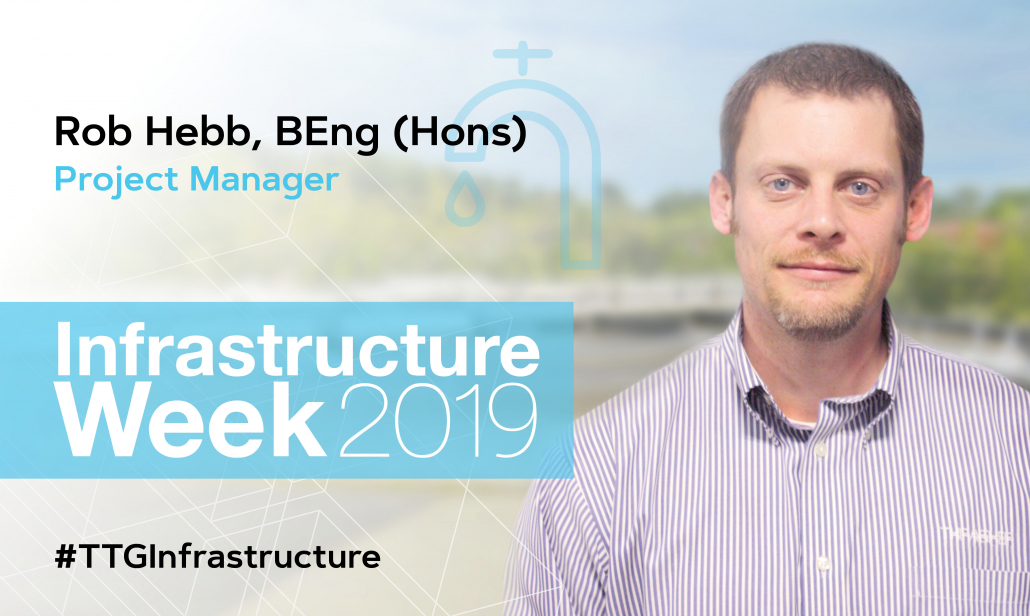
Rob Hebb, BEng (Hons)
After working 14 years with the Royal Engineers of the British Army, gaining experience in construction management and utility projects, Robb Hebb joined #TeamThrasher in 2010. Throughout his time at Thrasher, Rob has coordinated with public service districts to work on projects that include the transfer, treatment, and storage systems for raw water, potable water, sanitary and storm sewer systems. A notable project Rob managed was a waterline extension and system improvement in Wetzel County. This development included the construction of a new water treatment plant, 27-mile water line extension, and a new booster pump station.
Robb stated that water and sewer improvement projects have a substantial impact on the community’s infrastructure, “These improvements are essential to the general public, especially in West Virginia”. He expanded upon the fact that the state’s topography is unique, which entails a major factor into infrastructure improvement projects from an engineer’s viewpoint.
What are some lessons that you have learned through working on projects that improve infrastructure?
“It is important to design and maintain a cost-effective plan, that ensures your services will deliver a system and technology upgrade.”
What advice would you give an individual who is interested in entering a similar field and projects as yourself?
“Go into the project with open eyes, don’t discount any opinions that help lead to the end result. Listen to the client, make the project cost effective, and resolve the existing concern.”
5/14/19 – Transportation
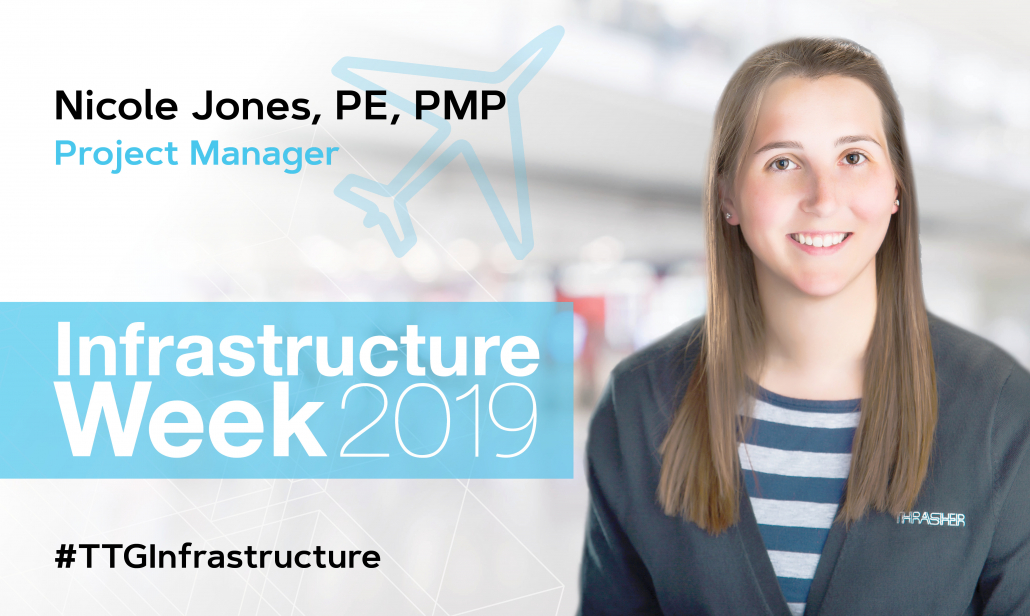
Nicole Jones, PE, PMP
Nicole got her start at Thrasher on the Transportation side of engineering. The airport improvement projects she worked on have a substantial impact on local community infrastructure. From repairing runways in Beckley to upgrading the Bridgeport airport’s terminal building, and has become an integral part of Thrasher’s Site Division serving as a Project Manager. She has worked alongside Thrasher’s team of talented engineers and support staff to design several million dollars’ worth of critical infrastructure upgrades for entities such as the West Virginia Division of Highways and the Federal Aviation Administration. She has managed a vast array of infrastructure enhancements related to the aviation industry, and helped her clients to secure several million dollars in grants to complete their upgrades.
For her largest client, the North Central West Virginia (NCWV) airport, Nicole has designed a variety of upgrades, including a runway safety study, lighting and security upgrades, ramp rehabilitation, terminal improvements, and a runway extension and widening. Her understanding of the permitting and regulatory hurdles that accompany this type of work has enabled Nicole to guide her clients through the design of safe and sustainable projects. She believes, “Improving infrastructure in locals communities produces more economic opportunities by creating more jobs.” She cites the NCWV airport gives the community access to career options and allows individuals the opportunity to travel to other parts of the country. “The current luxuries would not exist without infrastructure.”
What are some lessons that you have learned through working on projects that improve infrastructure?
“Communication with clients are key. You must be on the same page to provide services that create successful projects.”
What advice would you give an individual who is interested in entering a similar field or working on projects as yourself?
“It’s a great opportunity to be exposed to a wide variety of projects.”


